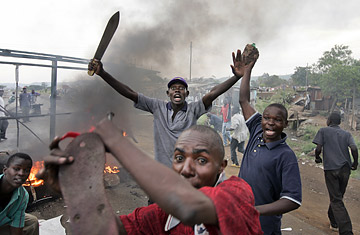
Kenyan men from the Luo tribe armed with machetes and rocks enforce a makeshift roadblock, searching passing vehicles for Kikuyus trying to flee the town in order to kill them, on the main road to the Ugandan border near the airport in Kisumu, Kenya, Monday, January 28, 2008.
Even as Kenya's President and main opposition leader launched negotiations aimed breaking their violent political impasse, the crisis reached a troubling new low with news that a recently elected member of parliament had been gunned down outside his home. At the same time, a new wave of ethnic violence has broken out across the country.
The talks, mediated by former U.N. Secretary-General Kofi Annan, began with President Mwai Kibaki and opposition leader Raila Odinga attending a ceremony that was shown in real time on television despite a government ban on live broadcasts that has been maintained since shortly after the disputed December 27 vote. "We all have multiple identities but I hope you see yourselves as Kenyans first," Annan said. "To the leaders gathered here today, I say that the people want you to take charge of the situation and do whatever possible to halt the downward spiral that is threatening this beautiful and prosperous country."
The leaders held a minute of silence to remember Mugabe Were, a young lawmaker with Odinga's Orange Democratic Movement, who was slain as he drove up to his gate in Nairobi late Monday night. The police said they had detained three people in Were's killing, which bore all the hallmarks of an assassination: he was shot at least twice in the head from a car that had pulled up next to his. "It is despicable that a member of parliament should be assassinated in this manner," Odinga told reporters earlier in the day. "We have witnessed five bullets that were shot into his body, two of them into his eyes. These were people who had planned an assassination."
The Kenyan police said they had arrested three people in Were's killing. Still, Were's death and the prolonged tension spurred attacks that included the beheading of a doctor in the nearby Kibera slum, an Odinga stronghold, and several reports of forcible circumcision of Luos, who traditionally do not practice that rite. The violence has pitted members of Kibaki's Kikuyu tribe, long accused of being the object of favors from successive Kenyan governments, against Luos, Luhyas and Kalenjin, which had hoped an Odinga victory in the December 27 election would right decades of perceived injustices.
Annan predicted that Kenya would only need a month to resolve the immediate political crisis and a year to solve the larger issues that have lingered — and sometimes been fomented by Kenyan politicians — since independence. Yet while Odinga and Kibaki have both said they want to negotiate, neither has shown any real commitment to resolving the crisis: Kibaki insists his election as President is non-negotiable, while Odinga says he will accept nothing but a new vote.
Angry crowds of Luos and Kalenjin also squared off along a road in the tourist town of Naivasha, an hour north. The clashes in Naivasha reached a near-breaking point on Tuesday, when army helicopters fired what police said were rubber bullets into crowds of demonstrators facing off against each other along a major road. "We know very well the police are not doing their work, they are also political, they are favoring one side, they are not caring for all people," said Odinga supporter Evans Maremi.
Naivasha and the nearby city of Nakuru have seen a spate of killings in recent days as Kikuyus launched revenge attacks against people they say were responsible for attacks that killed dozens of their tribesmen further north and pushed hundreds of thousands from their homes. Those killings have changed the tenor of the violence, which the opposition initially characterized as a spontaneous surge of rage among people furious about the vote. It now appears to have devolved into simple revenge killing.
Indeed, the fear was that the violence would begin to spiral out of control into a cycle of ethnic attacks as members of Kenya's different ethnic groups act on grievances they have harbored for decades over land and the perceived inequitable distribution of resources. That, in turn, could sink Kenya's economy, whose chief engines are horticulture, tourism and tea. All three industries have been crippled.
Still, amid the violence, there was some hope that Annan's mediation could lead to a compromise at last after a month of bloodletting. The death toll is now difficult to estimate, but it is believed that some 850 people have been killed since the vote, with about 150 of them killed since Friday, when Kikuyus launched what appeared to have been revenge attacks in Nakuru. "Today our country is under serious threat of sliding into anarchy," parliamentary speaker Kenneth Marende said.
The one thing that Kenya has going for it right now, it seems, is that the world is refusing to let the crisis fade into the background. The African Union has promised to consider the issue in a summit that begins on Thursday. And the special U.N. adviser on preventing genocide, Francis Deng, has warned that Kenya's politicians could be held responsible for any violation of international law. That came just days after the New York-based Human Rights Watch released a report concluding that there was some indication that the violence had been planned beforehand, particularly in areas where Odinga is popular. "There are evidently hidden hands organizing it now," Britain's Minister for Africa Mark Malloch Brown said as he stopped in Kenya to lend London's weight to the mediation efforts. "The targeting is very specific."
